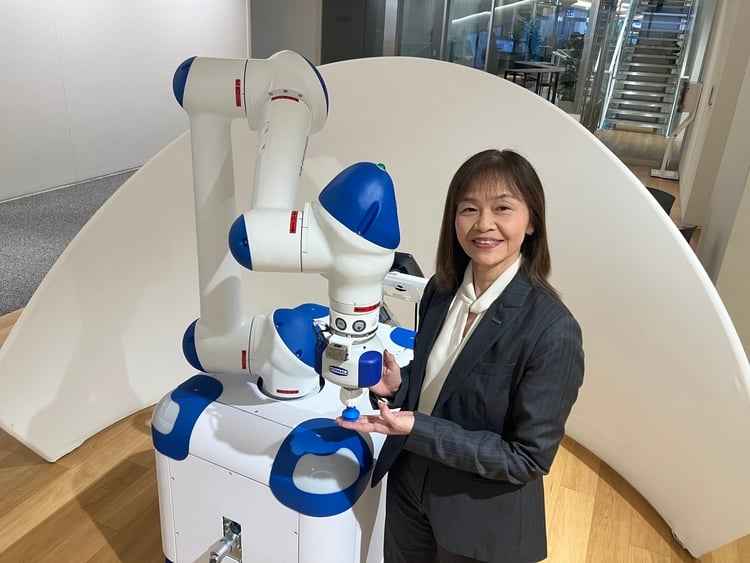
Yaskawa history
Yaskawa, the company I work at, was founded in 1915 and celebrates its 110th anniversary this year.
The company started in Kitakyushu City, a flourishing coal mining town, by providing motors and other electrical appliances to automate coal transportation. Our seniors' wish to make coal miners' labor as much easier as possible has been inherited as our DNA, and we have driven the electrification and automation of production sites with motors as the core since 1915.
Yaskawa commercialized the world's first servo motor in 1958. We then shifted our activities to mechatronics. (As a side note, the phrase "mechatronics" was originally created by Yaskawa in 1969. At the time, it was registered as a trademark, but soon released and is now commonly used.)
In 1977, we released Japan's first all-electric robot MOTOMAN-L10, which embodies mechatronics. Over the past 50 years, the company has developed robots that are adaptable to a wide range of applications. Today, there are approximately 200 models and more than 600,000 units shipped. This is exactly the progress of the global robotics business from the birth of robots.
My own path
I studied computer science at university, and after joining Yaskawa in 1991, I spent much of the time working in the Robot Division to develop software for robot controllers. Specifically, I worked on the development of programming pendants for human operation of robots and the opening function of robot controllers.
YASKAWA launched i³-Mechatronics concept to realize innovative automation solutions by using on-site automation and data generated from it in 2017. I led the development of YASKAWA Cockpit, the core product of i³-Mechatronics.
In 2019, I was appointed president of AI Cube, a subsidiary of Yaskawa. AI Cube specializes in AI in the manufacturing field. We have positioned AI as a tool to make effective use of on-site data, and are making various efforts to realize our vision of "creating a world where AI is used as a standard in manufacturing. "

In FY 2025, the “AI Robotics Division” was newly organized to aggressively promote AI × Robotics. As the general manager of this division, I am actively promoting the initiative to speed up automation in areas where automation has not been possible until now through "AI × Robotics.".
In my childhood, I wasn't particularly keen on robots, but was good at arithmetic.
And I loved thinking and creating something new. This isn't just electrical stuff, for example, cooking or small pieces of furniture. Of course, there were a lot of failures, but I often created what I wanted by imagining myself. I feel that I am able to develop AI today because of my background in computer science and software development, in addition to my craftsmanship. Being at the forefront of this new field of AI robotics, I myself have experience in the development of robots and working at customer sites where robots are installed, and I understand the difficulty and hardship of introducing the technology to the site, and I am exploring the market as an exit, which is my great motivation.
Our development is based on actual technologies and products that customers can use, not in the labs. That's why I feel a great responsibility, but I think that the keyword AI robotics will be more practical in society by greatly expanding the capacity of what can be done with industrial AI.
In the early days, the spotlight wasn't on controllers or software, but on hardware like arms. However, in the context of AI robotics, it has become clear that the true nature of quality must be determined in the controller, which represents the brain.
There are already many places where automation has been in progress, but automation has yet to be achieved for various reasons in markets such as food, construction, and agriculture. I hope that the use of AI tools will further promote automation and contribute to the development of society.
Yaskawa Principles state that people should live a safe, secure and humane life in society, and I believe that we can move toward this realization by faithfully implementing these goals.
In everything from running AI Cube, operating AI Robotics Division for new initiatives, and exploring the new field of unautomated areas, I am taking on challenges based on the wishes of my senior colleagues and DNA that has been inherited even now. Going forward, I will continue to keep an eye on the development of AI× robotics, as well as on motors, which are the origin of AI× robotics, and move toward new areas of automation with an always positive mind.
Thank you for your continued support.
Find out more about IFR's initiative "Women in Robotics".
IFR Secretariat
The General Secretariat is responsible for the daily management of IFR and the coordination of all major activities, events and collaboration. The General Secretariat handles all questions regarding IFR membership.

Dr. Susanne Bieller
IFR General Secretary
Phone: +49 69-6603-1502
E-Mail: secretariat(at)ifr.org

Silke Lampe
Communication Manager
Phone: +49 69-6603-1697
E-Mail: secretariat(at)ifr.org
Credits · Legal Disclaimer · Privacy Policy ·World Robotics Terms of Usage · © IFR 2026